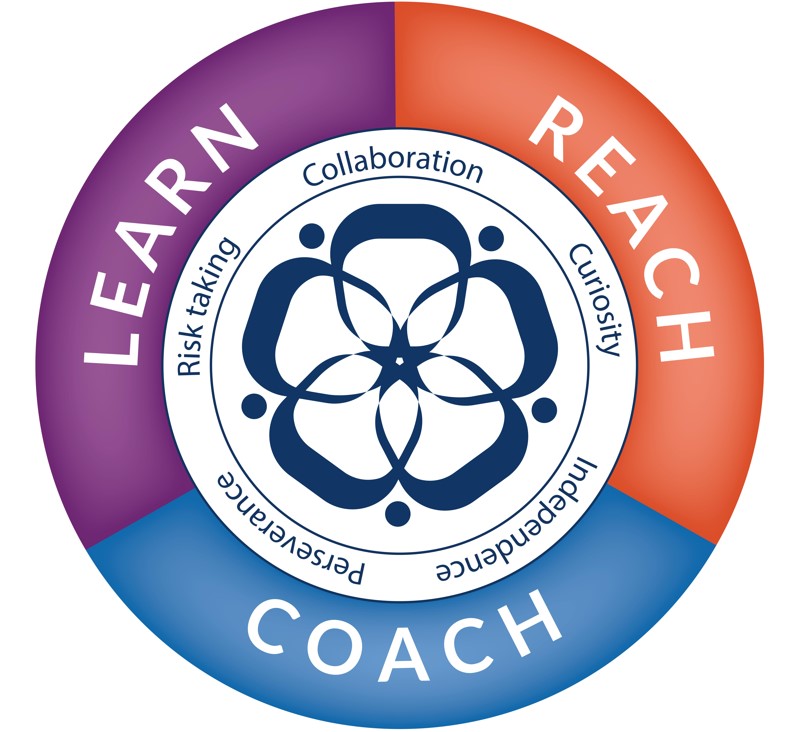
Under the High School Approach illustrated above, we aim to ensure that pupils are educated holistically and know there is more to learning than simply the pursuit of knowledge. Indeed, it is something of a trope nowadays to refer to the jobs of the future not currently being in existence. Any school that does not place future skills at the heart of its educational philosophy risks doing its pupils a disservice.
The need for an integrated vision for teaching and learning based on higher order thinking skills (HOTS) has become increasingly evident. This is why we are reviewing our core non-examined curriculum, including the Key Stage 3 Humanities Transferable Skills programme, and building an even more varied Elective and Enrichment programme in Years 10-13. It is also why we focus on the intellectual characteristics we see as vital for success, as reflected around the rose in the centre of the Approach wheel. However, in addition to this, we are also keen to break down the perceived walls between academic subject areas.
Cross-curricular links, lessons, and activities can help us build a transformative educational model that goes beyond traditional subject boundaries, enabling pupils to develop their thinking abilities. By fostering interdisciplinary connections, not only can we benefit students academically but also promote social interaction and collaboration, while opening up new avenues for teachers to collaborate and explore innovative teaching methods.
The last half term of the academic year has long been seen as a golden opportunity to develop more innovative approaches, in and out of the classroom. Younger pupils are, to an extent, freed from assessments and can delve deeper into the exciting academic worlds they inhabit at this time of year. This has led us to develop our Reach Cross-curricular fortnight to help foster links between the faculties in school and to take this freedom to the next level. To help give this fortnight a strong foundation, we have set a unifying theme of ‘The Unexpected’. Alongside this we will again run our WOW (watching others work) initiative that encourages teachers to visit others’ lessons to observe, learn and be inspired in their own practice.
The range of lessons and collaborations in the planning stage has been growing steadily over the last few weeks as Miss Kilby, the Reach Coordinator in school, has been working with colleagues across the school. A few examples of what pupils in Years 7 and 8 might expect are collaborations with Latin and Art – creating ancient and modern pots with an unexpected twist, Science and English – including pond dipping and descriptive language, and PE and Maths – developing understanding of links between shoe size and sporting performance.
All Year 7 and 8 pupils will also be given the chance to showcase their learning through a piece of ‘Open Prep’, which will take place over the second week of the fortnight, to replace the normal prep given by academic subjects. Parents and guardians of older children in the school may already have heard of our Open Prep initiative as this has been a long-running and popular event over the years for Year 9 pupils. In Open Prep weeks, pupils are encouraged to make truly independent choices in terms of the production of a piece of work on a given theme and we have been treated to a wide range of written projects, films, dances and musical compositions over the years. There is also a more formal side to the projects including documentation for planning, research and referencing, and pupils also record the project electronically in their eportfolios. Pupils are supported by a named teacher mentor and have a self-assessment sheet to reflect on the work.
We are confident our cross-curricular fortnight will encourage pupils to be 10% braver, while also promoting HOTS; challenging students to analyse, evaluate, and synthesise information from diverse sources. By engaging in interdisciplinary projects in class and for their Open Prep, pupils are encouraged to think critically, solve problems creatively, and apply their learning to real-world scenarios. This approach nurtures independent thinking, enhances intellectual curiosity, and ultimately equips students with the skills necessary for lifelong learning.
One of the significant advantages of cross-curricular links is the social interaction and collaboration it fosters among students. By working together on projects that cut across subject areas, students develop teamwork, communication, and interpersonal skills. They learn to value diverse perspectives, respect others’ opinions, and collaborate effectively, mirroring the dynamics of the professional world. These experiences build social intelligence and cultural awareness, enabling students to thrive in a globally interconnected society.
We believe that cross-curricular links not only benefit students but also offer significant advantages for teachers. Collaborating with professionals from different subject areas enables teachers to share resources and teaching strategies, leading to a more enriching and comprehensive learning experience for the pupils. Additionally, cross-curricular teaching offers teachers the opportunity to step out of their subject-specific silos and engage in interdisciplinary conversations and professional development. By working alongside other professionals, teachers can gain fresh perspectives, discover innovative pedagogical techniques, and broaden their repertoire. This collaborative approach revitalises teaching practices and invigorates classroom environments, leading to improved student outcomes.
We are confident that cross-curricular links, lessons, and activities can provide a powerful framework for the development of future skills and interdisciplinary knowledge. At Northampton High we strive to cultivate well-rounded individuals who are equipped for the future, however unexpected it may be. Harnessing the potential of cross-curricular links is one of the tools we are sure will help make a difference for our pupils.
Mr Rickman
Deputy Head Academic